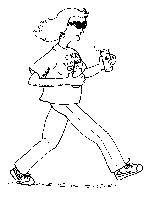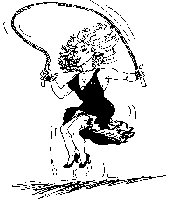Okay, Don't Quit

Chapter 6
Attacking the Habit
The next phase of the program puts more pressure on your habit cigarettes. You're already confusing the heck out of them by holding them differently and by adding actions to change the sameness. The time has come to start substituting other behaviors. The more incompatible the substitutions are with the actions of smoking, the better.
Your List
The substitution attack focuses on one habit cigarette at a time. When you're ready, pick a cigarette from your prioritized habit smoking list. When selecting these target cigarettes, it's usually easiest to start at the bottom of your priority list. If, however, you're doing a good job of confusing all of your habit cigarettes, your selections can come from anywhere on the list.
Use the list to keep track of which habit cigarettes are the focus of your substitution effort.
Substitutes
Select a habit type cigarette from your list. Next, think of an activity that's incompatible with smoking and do the activity instead of smoking that particular cigarette. Activities that give your mouth and hands something to do are best. For now, focus on substituting for that one cigarette.

For example, if the habit cigarette you choose involves smoking on the back porch, you could substitute watching the neighboring office activity with a pair of binoculars.
This substitute provides an activity for both hands. For your mouth, pop in some gum; for your lips, chew on a mint toothpick. That's almost ideal. These activities physically don't leave you free to smoke, and they're stimulating the same sensory areas.
Music offers a wealth of substitution possibilities, i.e., playing a wind instrument takes up your mouth as well as both hands.
Don't worry about conquering your entire smoking habit with substitutions. Focus on one cigarette at a time.
Larger actions can also be attacked with substitutions. For example, if you normally smoke a habit cigarette walking to the corner store, on the next trip pop a toothpick in your mouth and carry something in each hand. Nothing to carry? Take two paper cups, each half full of water, and water the plants when you get there. It may seem unusual to the corner store crowd, but it'll keep you from smoking just out of habit.

Each day try to find substitutes for another habit cigarette on your list. Be creative. Let your sense of humor through.
Spend some money on new substitutes. You'll get paid back in many ways.
The tools of the substitution game:
- Toothpicks (mint, etc.
- Gum
- Mints
- Juggling beginner's kit
- Magic kit
- Mittens
- Harmonica
- Wood puzzles
- Hand cream (Somehow it just isn't right to hold a cigarette when your hands are slippery.
- Hand held electronic games
- Hand held electronic language tutors/guides (Teach yourself French.
- A camera
- A diary
- A sketch pad
- Puppets
With a little imagination you should be able to uncover dozens of activities. Some people like to clean things, such as: tools, shoes, or fingernails. Others are attracted to skill-based contests like throwing darts, or horseshoes. Let your personal interests run free.
Corporate Grandstanding
To gain support for your efforts at work, let your boss and co-workers know about your stop-smoking program. The extra understanding will let you follow through on the exercises with less chance of annoying everyone around you.
It's always wise, though, to mix your enthusiasm with common sense. Playing the trumpet in the ladies room as a cigarette substitute may be pushing the system too far. Then again, maybe not. Juggling in the warehouse, on the other hand, could show top management you're someone who takes action to overcome a tough problem. With a little corporate grandstanding, you could turn a nasty habit into an organizational feather in your cap.
Weight Gain
Much of the weight gained after stopping smoking comes from a natural attempt to find substitute activities and stimulation. By integrating non-food substitutes into your daily routines, you can eliminate most of the food urge.

Another source of weight gain stems from one of smoking's side effects, that of an appetite suppressant — accounting for five to ten pounds.
The weight gain doesn't have to be automatic, however. If you include physical activities as part of your substitution efforts, you can offset any appetite change.
The Tough Ones
Certain situations have been the downfall of many smokers trying to quit. It may be a group meeting, a stressful visit, or a tavern setting. Although these scenes may have more than their share of physical and ritual connections to your habit, much of the difficultly stems from the "cold turkey" approach that was being tried at the time.
If you have a situation that puts severe strain on your smoking program, you need to recognize the problem and prepare for it. Most of these troublesome situations are very predictable. You go to the bowling alley every Tuesday night, or your sister visits every month, like clockwork. Since you can foresee the event approach, prepare for it. Have your best substitution and disruption techniques at the ready. By this time you should have a good collection of tricks at your disposal.